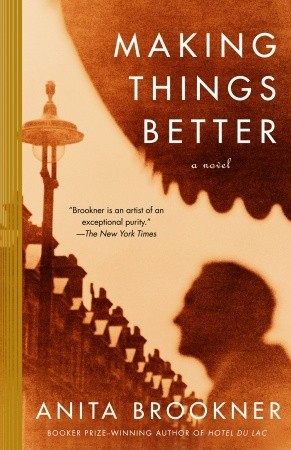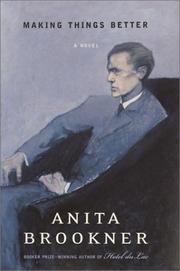 In a recent essay in the New York Times, “In Praise of Anita Brookner,” Rumaan Alam wrote, “Reading is an intellectual exercise (and as a writer, I can claim it as work) but I binge only when writers offer me pleasure. It’s less graduate seminar than love affair. I endorse this immersive way of reading, especially when it comes to Anita Brookner.”
In a recent essay in the New York Times, “In Praise of Anita Brookner,” Rumaan Alam wrote, “Reading is an intellectual exercise (and as a writer, I can claim it as work) but I binge only when writers offer me pleasure. It’s less graduate seminar than love affair. I endorse this immersive way of reading, especially when it comes to Anita Brookner.”
I am a fan of the Booker Prize-winning Anita Brookner. Her style is elegant and graceful, and I admire her dry humor. Most of her heroines are single, but it doesn’t matter if you’re single or married: you can identify, at least on occasion, with the emotions of her solitary heroines. I especially love The Rules of Engagement (which I wrote about here), a novel about two childhood friends who reconnect after they are widowed. They become doubles, much to the narrator Elizabeth’s chagrin.
And so, mesmerized by the New York Times, I went to my bookcase and took out my copy of Brookner’s 2002 novel, Making Things Better. It is a perfect novel, but it is relentlessly grim.
 The Jewish narrator, 73-year-old Julius Herz, is an uninteresting hero, and yet every detail of his day is made interesting by Brookner. He has been dutiful, always lived with his parents, and devoted his life to “making things better” for his family. After they left Nazi Germany and came to England, they lived like mice. He and his father worked in a music shop. When their employer-landlord asked them to leave the big flat for a tiny flat above the store, they obeyed, but Julius’s wife moved out. And now he has retired, and the time goes slowly. He takes walks, sits in the park, reads Thomas Mann’s Death in Venice (he prefers Buddenbrooks). visits the National Gallery, and goes to bed very early. He enjoys his routine.
The Jewish narrator, 73-year-old Julius Herz, is an uninteresting hero, and yet every detail of his day is made interesting by Brookner. He has been dutiful, always lived with his parents, and devoted his life to “making things better” for his family. After they left Nazi Germany and came to England, they lived like mice. He and his father worked in a music shop. When their employer-landlord asked them to leave the big flat for a tiny flat above the store, they obeyed, but Julius’s wife moved out. And now he has retired, and the time goes slowly. He takes walks, sits in the park, reads Thomas Mann’s Death in Venice (he prefers Buddenbrooks). visits the National Gallery, and goes to bed very early. He enjoys his routine.
He has never had a great passion, though he and his wife had good sex. And now, quite suddenly, he falls in love with his new neighbor, Sophie, a beautiful young financial advisor. When he accidentally lets her know–a slip of old age, a blurring of boundaries–it is disastrous. He does not understand quite what sexual harassment is. He goes into hiding, curtains closed, emotions shut down, leaving the flat only after she has gone out, and feeling hunted. The lease on his flat is running out. Could he escape to Switzerland and live in a hotel with his cousin Fanny, who rejected him long ago? And he realizes, finally, that he has lived his whole life as an exile.
He remembered, almost with impatience, the humble gratitude he had felt when he first took possession of the flat, the amazed delight with which he had furnished it, added to it, his timid pride at being a householder. Now that very timidity saddened him. He saw that he had lived his life as if it were under threat, as if he still bore the marks of the original menace and of the enormity that might have been his. This, he was convinced, made transience the only option, exile, impermanence, the route indicated for him so long ago. And it had taken a lifetime for him to understand this! At last he would take his place in history. In making his home in a country famed for its neutrality he would be obeying ancestral impulses. In that direction lay the safety he might yet come to desire.
Making Things Better is brilliant and Thomas Mann-ish, but I miss Brookner’s humor. And yet why should I expect humor? This is truly one of the saddest novels I have ever read.
I do love Brookner, but it might be good to drink some cocktails with little umbrellas in them to cheer you up while you read this.

I love most of her novels. I found I couldn’t read too many in a row (like Ishiguro) as in a way they repeat the previous, but every few months …. They are deeply melancholy and the humor self-deprecating, My favorite is her Booker Prize winner: Hotel du Lac, for which there is a fine movie. Unexpectedly perhaps — unless you read these first –, her art criticism is not quiet or satiric but upbeat: there is a sense of humor there. Her expertise seems to be the 18th century, Watteau (another melancholy soul). I read the art books first and was surprised by the novels.
LikeLiked by 1 person
I can binge on her early novels, but her later novels get bleaker and bleaker. I had to think about Making Things Better to appreciate the form and interweaving of Mann-ian elements. I agree her knowledge of art history is astonishing, and I adore the way she weaves it into her novels: her characters are always going to the National Gallery or the Tate.
I had idea there was a film of Hotel du Lac!
LikeLiked by 1 person
I need to give Brookner another chance, because I’ve only read Hotel du Lac (twice!) and it really didn’t gel with me. Maybe it *is* just the unremitting sadness.
LikeLiked by 1 person
Yes, some of her books are very bleak! And yet there are some very witty ones. She wrote so much, and deserved the Booker Prize more for some of later books than for Hotel du Lac.
LikeLiked by 2 people
I used to love her when she wrote about younger people, but as her characters and I have aged, I’ve found her truthfulness too hard and unbearable to read. I do still go back to the early ones, though.
LikeLiked by 1 person
I prefer the early ones, too. Really, this one was so bleak I almost didn’t finish it, though it is a perfect book.
LikeLiked by 1 person